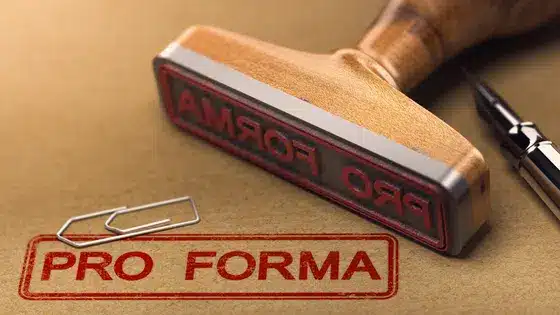In the business world, a well-organized array of documents ensures smooth service operation. Among these crucial documents are quotes, purchase orders, and invoices, all of which can be efficiently generated using invoicing and quoting software. Sometimes, however, a customer might request a proforma invoice. These invoices serve various purposes, such as justifying a future expense, securing loans for projects, or safeguarding against unpaid debts. In this comprehensive guide, Organilog explores proforma invoices, their significance, how to create them, and the transition to regular invoices.
Understanding Proforma Invoice
At first glance, a proforma invoice bears a striking resemblance to a standard invoice. It meticulously outlines all the services provided during a job or purchase, complete with commercial and legal information for the customer. In simpler terms, a proforma invoice is akin to a draft invoice, created before the final invoicing process.
However, it’s essential to note that proforma invoices do not hold any legal or accounting value. So, what purpose do they serve?
The key functions of a proforma invoice include:
- Negotiation and Modification: These invoices provide room for negotiation and modifications before the final invoice is issued. They facilitate transparent communication and effective negotiation between you and your client.
- Protection Against Unpaid Debts: Proforma invoices also act as a safeguard against potential unpaid debts. They empower you to negotiate with clients who might otherwise be unscrupulous.
- Client Benefits: Proforma invoices offer advantages to your clients as well. They can use them in various scenarios, including:
- Applying for a bank loan, whether for personal, work-related, or professional purposes. The presence of a proforma invoice in the loan application reassures the bank.
- Justifying significant expenses.
- Serving as valid proof for customs in cases of import/export activities.
Distinguishing Between a Quote and a Standard Invoice
A proforma invoice is essentially a draft invoice with no legal or accounting value. Consequently, it is not meant to be paid, does not have any legal standing, and should not be included in your company’s financial records. Unlike a genuine commercial invoice, proforma invoices are entirely editable.
Unlike quotes, proforma invoices do not bind both parties. These provisional invoices are created after the services are rendered, serving an entirely informative purpose.
The Essential Elements of a Proforma Invoice
While proforma invoices initiate discussions and negotiations between your company and the client, they must adhere to specific formatting requirements. A well-structured proforma invoice should include:
- A clear header that unmistakably states “Proforma Invoice” to avoid any confusion.
- Information pertaining to your business, including:
- Company name
- SIREN number
- Intra-community VAT number
- Registered address
- Legal status
- Date of issue
- Customer information.
- A comprehensive description of each product or service, along with their quantity and unit price.
- The total amount excluding tax, the VAT amount, and the total amount including tax.
- Payment terms and methods.
- Legal notices and general conditions of sale.
Additionally, proforma invoices should have their own unique numbering separate from standard invoices to distinguish them.
Transforming a Proforma Invoice into a Standard Invoice
Once your client agrees to the proforma invoice you’ve sent, you can proceed with generating the final invoice. To do this, you can utilize software that simplifies the process of creating electronic invoices.
If you’ve sent a proforma invoice that your client accepts, converting it into a regular invoice involves a few simple steps:
- Replace the words “proforma invoice” with “invoice.”
- Use the numbering sequence typical of your standard invoices.
- Update the invoice date.
- Include the payment due date.
- Incorporate any modifications that result from your negotiations.
Simplifying Proforma Invoices with Organilog
Organilog integrates comprehensive invoicing software functionality, making it easier to manage your invoicing processes. This module not only enables you to generate electronic invoices from quotes but also offers the ability to create and convert proforma invoices into standard invoices.
Managing proforma invoices with Organilog is straightforward, ensuring a seamless user experience. As with other documents, the software allows full customization of proforma invoices.
You can even create recurring proforma invoices and automatically generate the corresponding standard invoices. Here’s how it works:
- Create a proforma invoice with a fixed amount, whether monthly or quarterly.
- Set up the corresponding recurrence and select the “Generate invoices” option.
- The software will automatically create new invoices based on the provided template.
In terms of recurrence, the payment due date is dynamically adjusted according to the invoice model.
Organilog offers a robust and all-encompassing field service management solution, simplifying and optimizing your invoicing processes. It’s time to bid farewell to the age-old hassles of paper documentation and the risk of losing crucial documents. With Organilog, you can efficiently manage your expenses and the reimbursement process, leading to a more streamlined and cost-effective approach to handling financial matters.
In conclusion, understanding how to create proforma invoices is crucial for businesses, ensuring that negotiations, modifications, and safeguards are in place for both service providers and clients. By employing efficient tools and adhering to legal requirements, you can navigate the proforma invoice process seamlessly. To experience firsthand how Organilog can simplify your proforma invoice management, request your free personalized demo today!






















